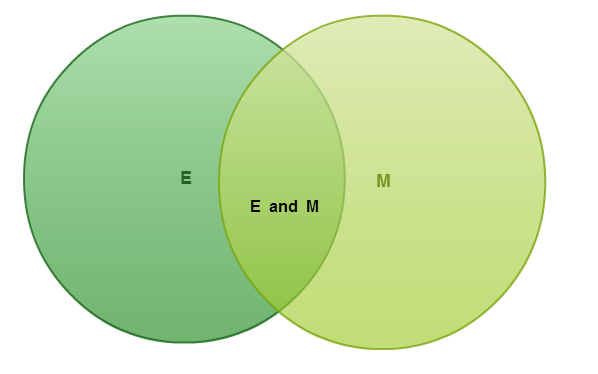Simple Venn Diagrams
Venn Diagrams
A Venn Diagram is a pictorial way to display relationships between two different sets (or groups) of things. The idea of a Venn diagram was first introduced by John Venn in the late 1800s and they are still one of the most powerful visualisations for relationships.
Here is a simple example
Let's think about the numbers between 2 and 20.
I'm going to create 2 groups, one for even numbers, and one for multiplies of 3.

We could call the sets after the events that are created.
Event E could be the "number is even".
Event M could be the "number is a multiple of 3".
So I can change the diagram to reflect this naming structure.

The next thing I do is write in all the numbers in the appropriate places. As I place a number I ask myself.... Is the number even? Is it a multiple of 3? Is it both? or Is it none of those options?

Take note of how the numbers that do not fit into either set are placed outside the circles.
Now that we have a Venn diagram, we can answer a whole range of questions.
List the items in events E, M and E&M
E = {2,4,6,8,10, 12,14,16, 18,20}
M = {3,6,9,12,15,18}
E and M = {6,12,18}
Probability that the number is Even
P(E) =$\frac{\text{total favourable outcomes }}{\text{total possible outcomes }}=\frac{10}{19}$total favourable outcomes total possible outcomes =1019
Probability that the number is a multiple of 3
P(M) = $\frac{\text{total favourable outcomes }}{\text{total possible outcomes }}=\frac{6}{19}$total favourable outcomes total possible outcomes =619
Probability that the number is both Even and a Multiple of 3
P(E and M) = $\frac{\text{total favourable outcomes }}{\text{total possible outcomes }}=\frac{3}{19}$total favourable outcomes total possible outcomes =319
Probability that the number is not even or a multiple of 3
P(not E or M) = $\frac{\text{total favourable outcomes }}{\text{total possible outcomes }}=\frac{6}{19}$total favourable outcomes total possible outcomes =619
Using a Venn Diagram can be a really powerful way to display information, and then interpret it in meaningful ways.
Worked Example
We are interested in the colour of a card randomly drawn from a standard deck. Which Venn diagram illustrates this?
 A
A B
B